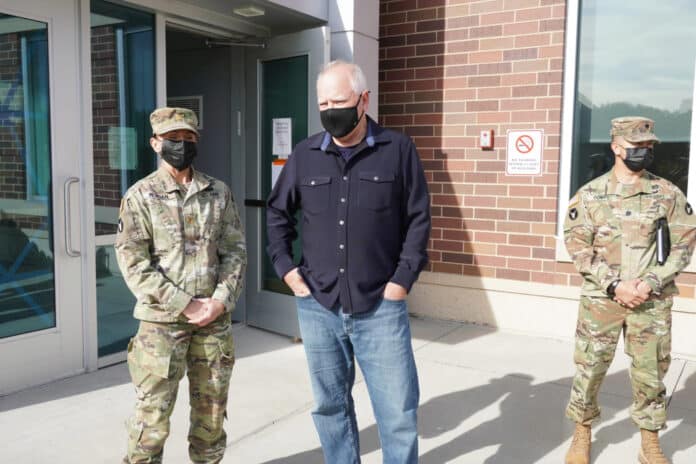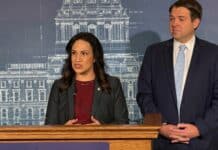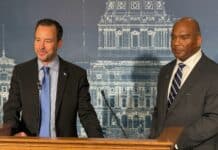
While the pandemic may seem old news for some people, the courts are just finally now getting around to deciding essential issues related to our personal liberties and constitutional rights. The wheels of justice often turn slowly, and you can never take your eye off of the ongoing battles in the courtroom. It is often that courts have to finally decide things years after the heat of the political battles has ended. The work remains essential.
The Minnesota Supreme Court upheld the emergency powers law, showing that legislative change is necessary to prevent future abuses of power
In a decision authored by Justice Gordon Moore on May 10, the Minnesota Supreme Court upheld Gov. Tim Walz’s declaration of the COVID-19 peacetime emergency and the constitutionality of the Minnesota Emergency Management Act — the law that Gov. Walz used to seize control of the state for 16 months and issue one executive order after another controlling minute details of Minnesotans’ daily lives.
The Court held (1) the emergency law allows a declaration of an emergency during a pandemic, generally; (2) the COVID-19 pandemic inherently affected “property” and Gov. Walz did not have to show any evidence supporting his emergency declaration; and (3) MEMA’s broad grant of power to the governor does not violate the Minnesota Constitution’s nondelegation doctrine. Retiring Justice G. Barry Anderson concurred in the result but noted that Minnesota’s current emergency management laws do raise serious constitutional concerns and should be revisited by the legislature.
We are disappointed with the Court’s decision. We at the Upper Midwest Law Center filed this action in August 2020 on behalf of 16 Minnesota citizens, business owners, and churches, challenging the governor’s executive order mandating masks in indoor public spaces. We argued that the governor was taking upon himself the whole legislative power of the state, but only the state legislature has the authority to enact such laws consistent with the Minnesota Constitution.
The Court disagreed with our position in part because it said it “refuse[s] to assume that the Legislature would act so wholly upon partisan interests that it becomes incapable of checking the governor’s powers in the manner it itself provided.” We respectfully believe that the Court’s view of the Legislature’s ability to look past partisan interests is misguided. Just in the last two years, the ruling trifecta passed one partisan unconstitutional law after another — and the federal District of Minnesota has issued one injunction after another setting those laws aside. It’s hard to imagine that a legislature so bent on using the slimmest of political margins to remodel the state, using votes from alleged felons to break the ties, is capable of setting aside partisanship to stop an ongoing emergency declaration when their guy is in the governor’s office.
The Court did note that the “breadth of authority granted to the governor under the Act is great, but so is the need of the executive branch to respond quickly in times of crisis. A delicate balance must be struck to ensure that Minnesotans are protected from both government overreach and emergent threats to their health.” And at this juncture, the Court did not have the opportunity to examine whether any particular emergency order which could be issued in the future violates other constitutional guarantees. So Minnesotans can still take specific future disputes over emergency orders to court.
In his concurrence, while agreeing with the Court’s result, Justice Anderson acknowledged that we at UMLC had “advanced arguments that, particularly with executive branch emergency orders issued over extended periods of time, raise serious concerns requiring legislative consideration. Experience has shown that legislative attention is necessary when the executive acts in prolonged periods of emergency.” Justice Anderson noted that “our Legislature may well wish to consider changes to Minnesota’s emergency management procedures that would better preserve, to the extent practicable, policy deliberation in its proper home: the legislative branch.”
We are concerned that this decision lays the groundwork for another seizure of Minnesota’s legislative power by this governor — or any future governor — for any claimed emergency in the future, without any need to prove one actually exists. Who knows what emergency, based on natural disasters, this governor or a future governor might declare, without any evidence that their proposed solutions will fix it. How about a climate emergency?
Moving forward, this decision highlights two great needs: first, a change to the emergency law that, as Justice Anderson put it, “preserve[s], to the extent practicable, policy deliberation in its proper home: the legislative branch.” We think this would look a lot like Wisconsin’s law, which eliminates never-ending “emergencies” by requiring both legislative houses to vote to continue an emergency after 60 days instead of both having to vote to end the emergency. Wis. Stat. § 323.10. So if the Red River floods, the governor can declare an emergency, but he can’t keep the emergency going without both houses agreeing.
Second, continued legal pressure through the courts is essential to stand against future seizures of power to uphold the rule of law and protect individual liberties in times of crisis. That is what we at the UMLC will continue to do, no matter who is in power.
Corporate America is running into court problems with their COVID-19 vax mandates
On May 24, the federal Eighth Circuit Court of Appeals, which presides over Minnesota’s federal courts, dealt a devastating blow to the Mayo Clinic’s defense of its decisions to fire employees for refusing to be vaccinated against COVID-19 because of their religious objections. At the same time, it was a big win for the fired employees and religious liberty.
In Ringhofer v. Mayo Clinic, the Eighth Circuit reversed a decision by a judge in the federal District of Minnesota dismissing five former employees’ cases against the Mayo Clinic. These cases arose under Title VII of the Civil Rights Act of 1964, which makes it unlawful to fire an employee because of their religion. Simple, right?
Unfortunately, it’s not so simple for some companies. Many companies, like the Mayo Clinic, fired a number of employees because they refused to be vaccinated, citing their religious beliefs.
These employees, represented by Gregory Erickson at Mohrman, Kaardal & Erickson, had clearly informed Mayo Clinic of their religious beliefs, stating that (1) they are pro-life and believe that taking the vaccine, which they believe was produced with or tested on aborted fetal cell lines, would make them complicit in the killing of innocent unborn human life; and (2) they believe their body is a temple of the Holy Spirit, as the Bible says it is, and that they cannot inject impure substances into their bodies. Yet Mayo Clinic fired them for not being vaccinated.
Under the test applied to these cases, all these employees have to show is that they have a religious belief that conflicts with the employer policy, they tell the employer about it, and the employer fires them for failing to comply with the policy.
The federal district court had tried to overly scrutinize the employees’ beliefs, claiming that the real reason for the employees’ objection to the vaccine is not religious but based on health or safety reasons, because they believe the COVID-19 vaccine could be harmful to them. But the appeals court rejected that argument, holding that judges in this circuit cannot “discount” or negate religious beliefs by identifying secular beliefs that also support a refusal to be vaccinated. In other words, if you are worried about the safety of the vaccine but also would refuse to get it anyway because you believe taking it would make you complicit in the murder of an unborn child, your religious view can’t be ignored because you also have safety concerns.
This is a big decision for religious liberty and for us at UMLC. We currently represent six individuals who were fired from their jobs because they refused to get the COVID-19 vaccine because of their religious beliefs. And with this decision, we are more confident than ever that we will prevail in proving that the corporate defendants committed religious discrimination. They will have to show, somehow, that they would have experienced a hardship by accommodating our clients, and I don’t see it happening.
That’s it for this episode of the Minnesota Law Report. You can learn more about the Upper Midwest Law Center by visiting umlc.org, and you can also make a confidential, tax-deductible donation on our website.









